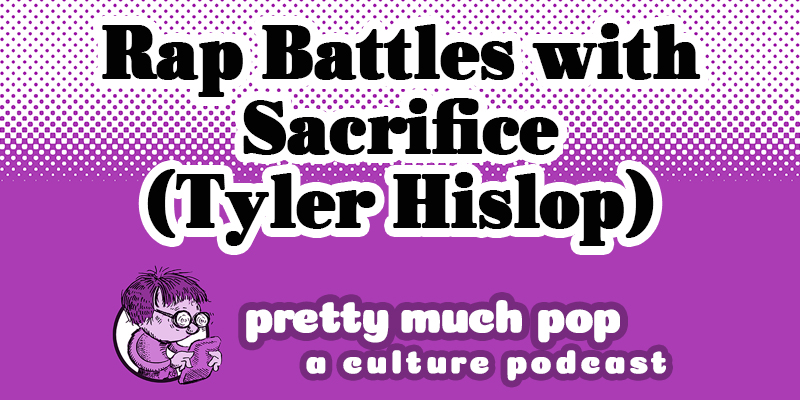
Pretty Much Pop hosts Mark Linsenmayer, Erica Spyres, and Brian Hirt are rejoined by our audio editor and resident rapper Tyler Hislop (rap name: “Sacrifice”) to discuss a form of entertainment close to his heart: Two people staring each other in the face in front of a crowd and taking lengthy turns insulting each other in a loud voice using intricate rhymes, references, jokes and even some cultural commentary and philosophical spit-balling.
So what are the rules? How does modern battle rap compare to free-styling, the beefs aired on rap albums, and classic insult comedy? What’s the appeal of this art form? Is it because of or despite the aggression involved? Battle rap is regarded as a free speech zone, where anything’s fair game, but does that really make sense?
A few relevant films came up in the discussion:
- Bodied (2017), a film written by Alex Larsen (aka Kid Twist) and produced by Eminem, featuring several current battle rappers doing their thing along with discussion by the characters of the ethical issues involved
- 8 Mile (2002), a semi-autobiographical film starring Eminem, which displays the older, free-styling over a beat type of battle rapping
- Roxanne Roxanne (2017) a biopic about Roxanne Shante depicting hip-hop rivalries of the 1980s.
Here are some matches Tyler recommended that also get mentioned:
- Conceited vs. Dumbfounded. Perhaps the most viewed battle of all time
- A 2×2 battle: B. Dot/Geechi Gotti vs. A. Ward/Loso. Note that the latter are “Christian-based” rappers.
- A compliment battle: Pat Stay vs. Rone.
- Immaculate vs. Soul. Immaculate is Tyler’s favorite battler, and Soul is Scottish.
- More: Pat Stay vs. Charron, Rone vs. Big T, The Saurus vs. Daylyt, Shotty Horroh vs. Arsonal, Calicoe vs. Bigg K, Shotty Horroh vs. Tony D
- Not actually rap battles: Trump vs. Biden, Keynes vs. Hayek
More resources:
- The Battle Rap Hall of Fame
- Wikipedia on Battle Rap
- The Ruin Your Day YouTube Channel where battle rappers comment on notable battles.
- “A Brief Hip-Hop History of Rap Battles” by Jake Hall
- “Flyting Was Medieval England’s Version of an Insult-Trading Rap Battle” by Tao Tao Holmes
Hear Tyler talk about his many rap albums on Nakedly Examined Music #24.
Hear more of this podcast at prettymuchpop.com. This episode includes bonus discussion you can access by supporting the podcast at patreon.com/prettymuchpop. This podcast is part of the Partially Examined Life podcast network.
Pretty Much Pop: A Culture Podcast is the first podcast curated by Open Culture. Browse all Pretty Much Pop posts.
An Introduction to Rap Battles: Pretty Much Pop: A Culture Podcast #71 is a post from: Open Culture. Follow us on Facebook, Twitter, and Google Plus, or get our Daily Email. And don't miss our big collections of Free Online Courses, Free Online Movies, Free eBooks, Free Audio Books, Free Foreign Language Lessons, and MOOCs.
from Open Culture https://ift.tt/3oaPy8q
via Ilumina
Comments
Post a Comment